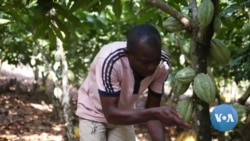Chocolate makers are expected to raise prices this year due to higher costs of cocoa from exporters like Ivory Coast, the world's largest cocoa producer.
Hershey, the largest producer of chocolate products in the United States, said last month it will raise prices on its products across the board due to the rising cost of ingredients.
Meanwhile, chocolate makers like Dana Mroueh said they are seeing cocoa prices rise in Ivory Coast, the world's biggest cocoa producer.
"We've noticed the price of cocoa is going up these few years, especially organic cocoa. So, from the beginning to today, those five years, we can say the price has risen 20 percent," Mroueh said.
Demand for chocolate in America increased during the COVID-19 pandemic, and cocoa producers in Ivory Coast are struggling to keep up with that demand.
Experts say one reason is the impact of climate change.
Harvard University says that by 2030, parts of West Africa will be too hot and dry to adequately produce cocoa. The West African countries of Ghana and Ivory Coast alone produce 70 percent of global supply.
Cocoa farmer Raphael Konan Kouassi took VOA to his plantation, a shady orchard where fat green and yellow cocoa pods hung from tree trunks. He said trees are yielding less due to rising temperatures and poor rains.
"Almost all of the young plants die in the high season. If you have not been able to get water to them, you have no cocoa," he said.
Kouassi receives government assistance in the form of cocoa trees, which are more resilient to the fluctuations of climate change, but he said government distributions happen at the wrong time of year for the saplings to survive.
Christian Bunn of the Consortium of International Agricultural Research Centers, a global scientific organization, said information about how the climate is changing can inform farmers on how to better nurture their crops.
"What we're seeing is that the onset of both dry and wet season can change. It's less reliable. During the season, there may be breaks in terms of rain during the dry season, or there's a dry spell during the wet season, and the overall distribution or amounts of rainfall they're receiving may change," Bunn said.
The data shows it may be better for farmers to stop producing cocoa and diversify into other crops, he said.
However, Olga Yenou, the CEO of an Ivorian company that supplies The Hershey Company, said higher prices for cocoa could be welcomed by farmers.
"My opinion is that these farmers should have better prices, should earn more, because they work hard. Most are poor," Yenou said.
Her wish appears to be coming true. As climate change continues to bite, prices continue to surge.





